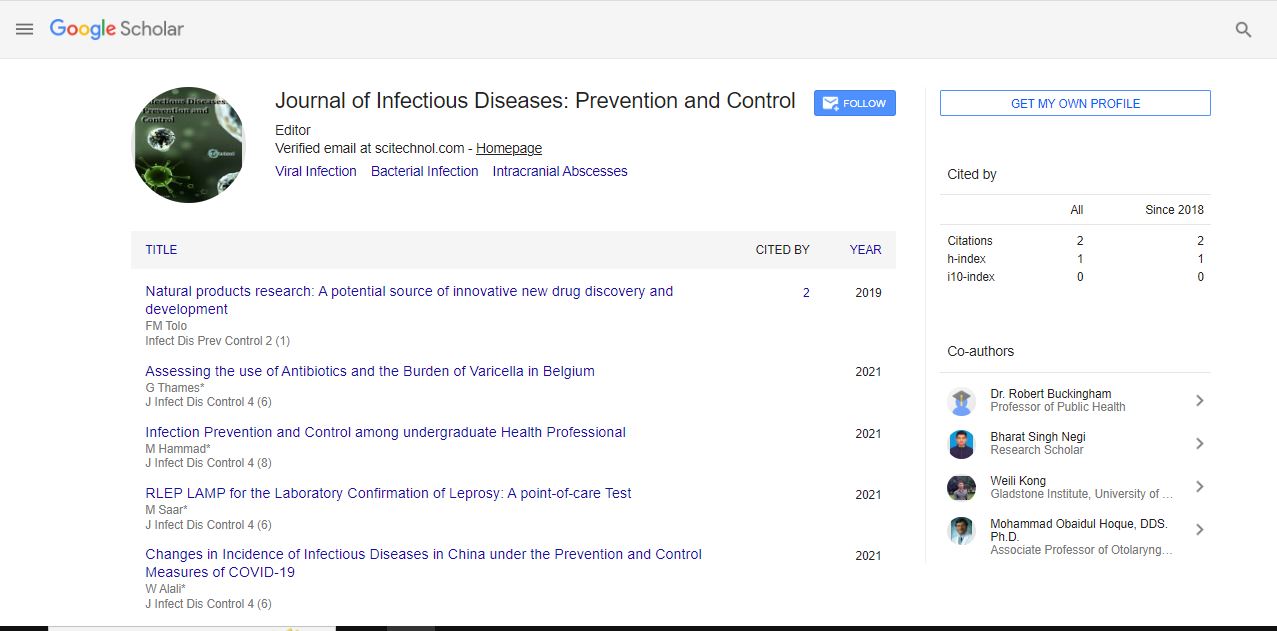Opinion Article, Infect Dis Prev Control Vol: 6 Issue: 4
Managing Infection Consequences in the Viral Vortex
Gurskis Cordero*
1Department of Medical Microbiology and Infection Prevention, University of Groningen, Groningen, The Netherlands
*Corresponding Author: Gurskis Cordero,
Department of Medical Microbiology
and Infection Prevention, University of Groningen, Groningen, The Netherlands
E-mail: gurscorder@ug.ac.nl
Received date: 24 November, 2023, Manuscript No. IDPC-24-127261;
Editor assigned date: 27 November, 2023, Pre QC No. IDPC-24-127261 (PQ);
Reviewed date: 11 December, 2023, QC No. IDPC-24-127261;
Revised date: 18 December, 2023, Manuscript No. IDPC-24-127261 (R);
Published date: 26 December, 2023, DOI: 10.36648/idpc.6.4.150
Citation: Cordero G (2023) Managing Infection Consequences in the Viral Vortex. Infect Dis Prev Control 6:4.
Description
The ongoing transmission of viral illnesses is a persistent threat to human health, demanding a detailed understanding of the consequences viruses leave behind. Viral infections, characterized by the ability to take control of host cells for replication, develop a dynamic and complex environment commonly referred to as the viral vortex. The consequences of viral infections extend beyond the immediate symptoms, influencing various aspects of individual and community well-being. At the individual level, the immediate health impacts of viral infections can vary widely. While some infections result in mild symptoms or even remain unnoticed, others lead to severe illness with potentially life-threatening consequences.
Managing these consequences involves prompt and accurate diagnosis, followed by appropriate medical interventions customized to the specific virus. In the era of emerging viral threats, such as novel coronaviruses, the importance of early detection and containment strategies becomes even more pronounced. Rapid testing, contact tracing and isolation protocols are integral components of managing the immediate health impacts and minimising the spread of viral infections within communities. Beyond the acute phase, certain viral infections may exert long-term health consequences. Chronic viral infections, such as those caused by hepatitis viruses or the Human Immunodeficiency Virus (HIV), can lead to persistent health challenges, including liver damage or immunosuppression.
Managing these long-term consequences often requires ongoing medical care, antiviral therapies and, in some cases, lifestyle adjustments. Recurrent viral illnesses, a growing area of analysis focuses on understanding the potential for post-viral syndromes. Conditions like long COVID, associated with persistent symptoms following the resolution of acute illness, highlight the need for comprehensive approaches to address the diverse and evolving consequences of viral infections. An integral aspect of managing the consequences of viral infections lies in preventive measures. Vaccination, when available, provides a powerful tool to bolster immune defenses and mitigate the severity of infections. Public health campaigns promoting vaccination not only protect individuals but also contribute to community-wide immunity, reducing the overall burden of viral diseases.
In addition to vaccination, public health strategies encompass hygiene practices, such as handwashing and respiratory etiquette, to interrupt the transmission of viruses. Awareness and education campaigns play a vital role in empowering individuals to adopt preventive measures and contribute to the collective effort in managing infection consequences. The development of antiviral therapies represents a difficult frontier in managing the consequences of viral infections. Antiviral drugs customize specific stages of the viral life cycle, inhibiting replication and reducing the severity and duration of illness. Analysis and innovation in this field continue to yield novel treatment options, providing potential for more effective management of viral infections. Furthermore, supportive care measures, such as adequate hydration, rest and symptom management, play a pivotal role in easing the burden of viral illnesses on individuals. In the context of emerging viruses, collaborative efforts between analysts, pharmaceutical companies and healthcare providers are essential for expediting the development and distribution of effective antiviral treatments.
Conclusion
Managing infection consequences extends beyond individual and clinical realms to encompass broader societal responses. Effective communication, transparent information sharing and the implementation of evidence-based policies are important components of a comprehensive strategy. Governments, healthcare systems and communities must collaborate to establish robust public health infrastructures capable of responding swiftly and efficiently to viral threats. In the ever-evolving landscape of viral infections, managing the consequences requires a multifaceted and adaptable approach. From immediate health impacts to long-term considerations and from preventive measures to treatment strategies, a comprehensive response is essential.
 Spanish
Spanish  Chinese
Chinese  Russian
Russian  German
German  French
French  Japanese
Japanese  Portuguese
Portuguese  Hindi
Hindi 